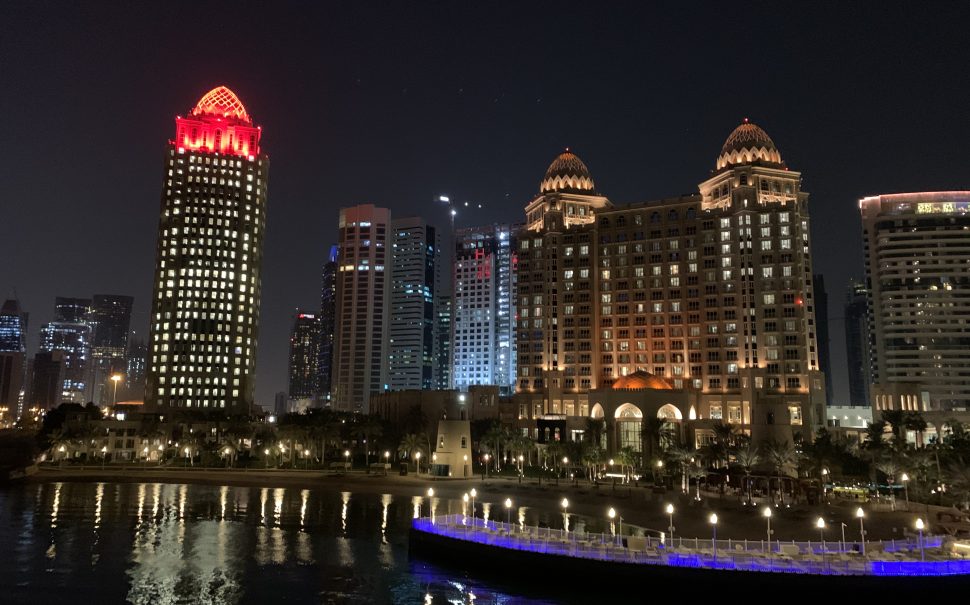Some football fans have welcomed the ban on alcohol sales at all eight World Cup stadiums, following the shock U-turn by Fifa yesterday – just two days before the tournament begins.
Qatar had previously agreed to relax its strict alcohol restrictions to permit the sale of beer at World Cup venues within the ticketing perimeter.
This followed a £70 million sponsorship deal which granted Budweiser exclusive rights to sell their products at stadiums and fan zones.
Now, only the sale of alcohol-free Bud Zero is permitted to general ticket holders at all stadiums.
Sam, a 20-year-old Wales supporter who has lived in Doha since 2016 and now studies at the University of Manchester, will be attending five games throughout the tournament.
He believes that it’s not the beer ban that will deter fans from drinking. Instead, he thinks it’s the price.
Football fans will still be able to purchase alcohol at designated fan zones around Doha – for £12 a pint. “If [fans] want to drink as much as they normally do it will cost an arm and a leg,” he said.
Sam predicts the ban won’t affect how much fans will drink.
“I think people will drink [in fan zones] all day and then make their way to the stadium,” he said. After the match, he plans to drink in a licensed bar.
“The biggest shock for Western fans will be not being able to buy a four-pack whilst en route to the stadium because no shops sell it.”
It is understood that drunk fans will be sent to special zones to sober up rather than face police intervention, despite it being an offence to be drunk in public in Qatar.
Mancunian Matters spoke to two Brits who live and work in Qatar, who thought the fan response to the beer ban has been exaggerated by the Western media.
Given this is an Arab World Cup which will be attended by lots of people who wouldn’t expect to drink, the reception in Doha has been largely positive.
Being a Muslim nation, legislation in Qatar is guided by Islamic Law. Alcohol consumption is “not part of local culture,” according to Qatar’s cultural awareness guidance, and is only available at licensed hotel restaurants or bars.
For many Muslim football fans, the U-turn means it is likely to be their first experience of a major football tournament – and especially a World Cup – without the negatives associated with alcohol consumption in stadiums.
Arij, 21, lived in Qatar for most of her life, before moving to the UK for university in 2019. She flew into Doha this morning and will be attending the England v Wales game. Arij doesn’t drink, and welcomes the beer ban.
“I don’t really understand the need for alcohol to enjoy an event like football,” Arij said. She finds that alcohol often leads to “disruption and hooliganism” in football stadiums.
“Not all people who drink at matches are part of the violence, but alcohol definitely fuels the fire.”
Gianni Infantino, the Fifa President, also hit out at the West for their criticism of Qatar in a press conference today, on the final day of World Cup preparations in Doha.
He said: “I am European. For what we have been doing for 3,000 years around the world, we should be apologising for the next 3,000 years before giving moral lessons.”
In defence of the beer ban, Infantino said: “If you can’t drink beer for three hours, I think you can survive.”
Arif agrees. She believes some of the criticisms have been fair, but “there’s a lot of hypocrisy as well. The same people bashing Qatar will happily go to Dubai.”
The U-turn, however, has shocked many Western fans, many of whom have taken to social media to express their frustrations with World Cup organisers.
In response to a @Football_Tweet post quoting Infantino’s statement, one Twitter user wrote: “It’s not that you can’t survive without a beer but for lots of football fans it gets you in the mood. It creates an atmosphere, gets people singing. Let’s see what happens in this soulless world cup.”
The Football Supporters’ Association (FSA) has criticised the decision, claiming “the real issue is the last minute U-turn which speaks to a wider problem – the total lack of communication and clarity from the organising committee towards supporters.”
Following the announcement, the FSA also shared concerns over “whether [Qatar] will fulfil other promises relating to accommodation, transport/cultural issues.”
Attendees with a corporate hospitality ticket are excluded from the ban. Corporate areas of the stadiums will still be able to serve alcohol, including champagne and whisky.
Prices for these tickets start at £19,000, which has sparked outrage on social media. Video creator Alfie Potts Harmer took to Twitter to call out World Cup organisers for the hypocrisy of this decision.
The beer ban is the latest of many controversies tied to the 2022 World Cup. W
ith the tournament itself overshadowed by the human rights concerns over the migrant workers who built the stadiums, as well as the uproar over the host country’s strict laws against homosexuality, Qatar has been plagued with scrutiny since winning its bid in December 2010.
The first match of the World Cup will kick off tomorrow, when Qatar will play Ecuador in the Al Bayt stadium.




